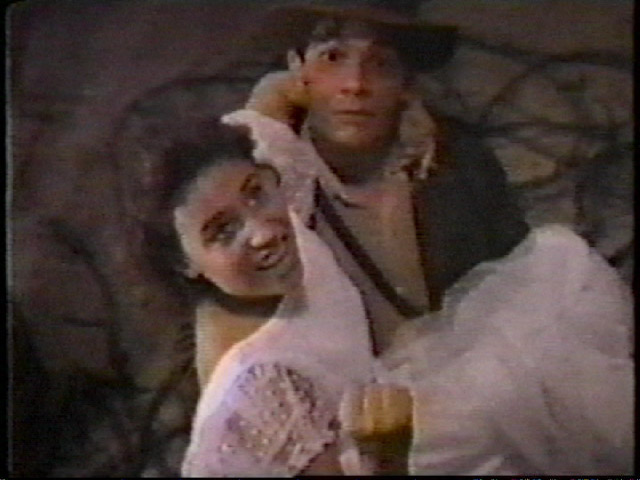Peter Jackson’s remake of King Kong has certain quarters of the internet abuzz with anticipation. Which is only natural: Jackson is coming off an epic project that won both critical and audience acclaim, and moving on to a reworking of a much-loved classic. Sources such as Ain’t It Cool have been at their most openly slavering. (Here’s an Ain’t It Cool quote for the poster: “I am bonerized.“) This is the kind of “this is going to be huge” internet buzz that most other productions can only dream of. The producers of the remade Poseidon Adventure, for example, have engaged in an elaborate process of set visits for the biggest on-line movie sites that has resulted in series of dutifully impressed articles, but little of the genuine excitement that some of the fan community show for Kong.
Stephen Rowley
Raiders of the Lost Ark: The Adaptation (Eric Zala, 1989)
In 1982, three twelve-year-old fans of Steven Spielberg’s blockbuster Raiders of the Lost Ark (released the previous year) decided to direct their own home made remake. Eric Zala directed and played the chief villain, Belloq; Chris Strompolos played Indiana Jones; and Jayson Lamb took care of the cinematography and special effects. The “Raiders Guys” filmed on and off for seven years, completing their “adaptation” in 1989, after the release of the second official Raiders sequel, Indiana Jones and the Last Crusade. After a well-received screening for the local community (many of whom had been enlisted in the project), they put the film away and forgot about it until 2003, when friends-of-friends passed the movie to Harry Knowles of the website Ain’t It Cool. Knowles played the film at his “Butt-Numb-a-Thon” film festival in Texas, and wrote a rave review, describing it as “the best damn fan film I’ve ever seen.” In 2004, a detailed article about the production followed in Vanity Fair. Despite very limited screenings – the film is a flagrant copyright violation, so both screenings and the circulation of copies have been tightly controlled – the legend grew. Raiders of the Lost Ark: The Adaptation has become one of the most famous fan films ever made, and it deserves all the praise heaped upon it. It is more than just a credit to its makers’ ingenuity and love of Spielberg’s original: what might have been expected to be just an amateurish imitation becomes a wonderful mix of loving tribute, comic riff, and childhood memoir.
Wait Means Never (Andrew Groves, 2004)
Andrew Groves’ Wait Means Never, the winner of Best Film at the 2005 Melbourne Underground Film Festival, is a timely and important film that deserves wider distribution than it has thus far received. It tells of four young extreme-left activists – Elizabeth (Rebecca Lowman), Paul (Mark Rizzo), Tom (David Haydn Jones), and Linda (Marissa Petroro) – who grow frustrated by the ineffectiveness of conventional methods of protest, and in desperation kidnap the head of an international oil company and hold him hostage. The film spends roughly equal time on the lead-up to, and the unfolding of, the kidnapping, and explores the psyche of the kidnappers as the situation deteriorates.
[Edit, 2021 – I came across this piece, which I had completely forgotten about, while sprucing the site up after a redesign. For a moment I was tempted to unpublished it, but that would be the coward’s way out. I am leaving it here as what, looking back, must be the worst take on the site.]
The news that Daniel Craig will take over the role of James Bond in the upcoming Casino Royale has been greeted with a brief flurry of perfunctory publicity, but what seems to be general apathy. It’s not hard to see why: as Jaime J. Weinman put it, “The Bond movies are basically the big-budget equivalent of an endlessly-running TV adventure show, and replacing Bond doesn’t mean much more than replacing Dr. Who.” Which, as a Bond fan, is sad but indisputably accurate.
You notice all sorts of things when you can (finally) see a cartoon on DVD. This is from Chuck Jones’ classic Three Bears short A Bear For Punishment (1951):

The things DVD can tell you about the lives of cartoon characters.
iFMagazine has a really interesting update – brought to my attention by Dark Horizons – on the status of the sequels to Pirates of the Caribbean. It’s interesting not because I care about the sequels (I enjoyed the first film, but it screamed “fluke” to me and I always expected any sequels to resemble Cutthroat Island), but for what an overly candid director can let slip about the production process for Hollywood movies today:
Although the movies are shot back-to-back, Verbinski reveals they’re shooting both films simultaneously with both scripts constantly in flux.
“We’re shooting scenes in the third movie without even knowing what the hell we’re doing,” laughs Verbinski. “We actually have a pretty good second script and the third script is still on the operating table. And we’re in triage constantly, everyday. I don’t recommend making two movies at once. I think that we’re going to get there, but it’s just madness. You’re like building ships and the ships aren’t ready and you have four hundred extras. There’s a lot of fun and I think that the second movie is strong and clever and has a lot going on. The third movie we’re still working on.”
Verbinski did discuss shooting back-to-back movies with director Peter Jackson who did three films at once with his LORD OF THE RINGS trilogy and he did have one bit of advice.
“I did talk to Peter Jackson about it and he said, ‘Re-shoots,'” says Verbinski who adds that might not be a luxury the PIRATES sequels will have. “We don’t have time for re-shoots. We don’t have the time.”
The second wave of Looney Tunes DVDs – consisting of The Best of Bugs Bunny Volume 2, All Stars Volume 3, The Best of Tweety and Sylvester Volume 1, and The Best of the Road Runner Volume 1 – is now in Australian stores. The documentaries in these are much better than the first round, and the best of them is a solid twenty minute documentary on Bob Clampett. This, and the inclusion in this wave of several of Clampett’s best cartoons (including Porky in Wackyland, Kitty Kornered, The Great Piggy Bank Robbery, and A Corny Concerto) should help raise awareness of Clampett’s work. Clampett is much better known than he used to be, but there remains, I think, a huge discrepancy in the way in which his reputation has grown. Amongst animation buffs he now rivals Tex Avery and Chuck Jones as the most revered American animator outside of Disney, and yet he has never become a household name in the way that Jones, Avery or Friz Freleng have. In the wider popular consciousness, fate has conspired to leave one of the major Warner directors a relative unknown, and it’s well past time for a more widespread rediscovery of his work.
As a very belated postscript to my Willy Wonka / Charlie review, I thought it was worth expanding on my comments about the tantalising collaborations that almost happened throughout Roald Dahl’s life. Dahl was a very difficult and in some ways a very solitary man. It’s probably telling that the only really protracted creative collaboration he had while alive was with the illustrator Quentin Blake. That was a partnership founded on a lack of direct interaction: while Dahl and Blake were a perfect fit for each other, they didn’t really work together. Dahl would turn over his writing, and Blake would illustrate it.
When you consider the passion, seriousness, and self-importance with which many indulge their passion for wine, the controversy surrounding Jonathan Nossiter’s documentary Mondovino is perhaps not surprising. The film is a survey of the international wine industry that suggests that as the industry is being globalised, wine culture is being homogenised. It points to the disproportionate influence wielded by certain figures (notably American wine critic Robert Parker) who serve as literal tastemakers, leading to the development of a global wine style at the expense of localised wine cultures.
Mondovino (Jonathan Nossiter, 2004)
Whenever a controversial documentary rolls around, we discover just how naïve the attitude of many commentators to documentary is. As part of the process of rebuttal of any politically challenging film, critics from the right tend to peddle a false view of what documentaries are about (and this is just about always done from the right, for despite the prevailing political tendencies of the day, the widely distributed political documentaries are still generally from the left). Documentaries have to be objective, they argue: they have to put both sides of the story. I lost count of the number of times I saw people seriously argue the absurd proposition that Fahrenheit 9/11 wasn’t even properly considered a documentary because it was so focussed on arguing a particular point of view. Which is, of course, rubbish. Documentary makers have every right to argue a particular proposition, rather than somehow presenting an all-encompassing “balanced” or “objective” overview. Indeed, if we argue that they don’t have such a right, we strip documentaries of much of their point. This doesn’t mean that we have to just accept a poorly justified argument without complaint, or that we can’t engage with and criticise the argument that a documentary puts. I’m just saying that we need to move straight into that discussion, rather than attacking documentaries as propaganda simply because the filmmaker argues a single point of view. Does every film really need to be its own rebuttal?


